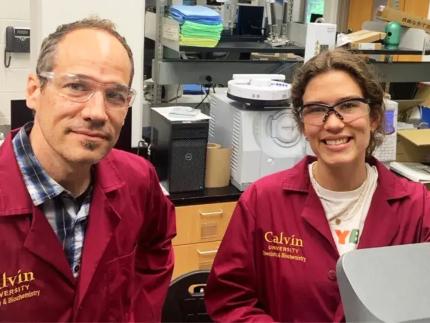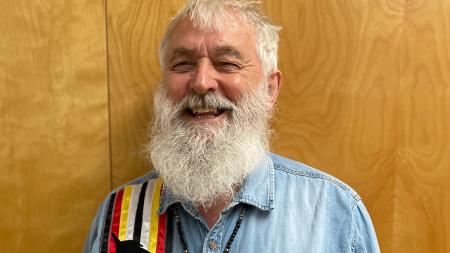Three Calvin Students Earn Goldwater Award

Aerin Baker (Saugatuck, Mich.), Maggie Grabill (Ada, Mich.), and Ava Tatko (Grand Rapids, Mich.) have been named 2025 Goldwater Scholars. The scholarship, awarded by the Barry M. Goldwater Foundation, is widely considered to be the most prestigious award for undergraduate students in the natural sciences, mathematics, and engineering in the United States.
More than 1,300 students from 445 schools applied for the award, but only 441 students received it. This marks the second straight year that three Calvin University students earned the distinction.
“To have multiple students most years earning this distinction is a testament to the strength of our students and the strength of our research programs here at Calvin,” said Chris Hartemink, professor of engineering and Calvin’s campus representative for the scholarship.
Common to all three students’ experience is that they were invited into research during their first year at Calvin. And they discovered that this would provide access to their professors and make them partners in the research.
“The professors are so intentional about connecting with you as an individual, as a person – and that grows during the research,” said Baker, a junior studying chemistry. “You are working alongside your professors, not under them.”
“Whenever I had advice to give or a research-related question to ask, I could walk into my research advisor’s office anytime and sit down and have a conversation,” said Tatko, a junior studying engineering with an energy, environmental, and sustainability concentration. “At a larger university, where you have more of an impersonal relationship, that is not an option.”
Having their names listed as coauthors alongside their professors’ in major journal articles further validated that experience, they said.
“We’ve published four papers, and we are working on a fifth now,” said Baker, who also presented her research at the American Chemical Society’s National Meeting in Denver, Colo., last summer. “My advisor [Professor Doug Vander Griend] and I are also working on a collaboration with a university in France.”
Grabill, a chemical engineering and chemistry double major, is a sophomore, and she already has two publications to her name.
As for Tatko, she’s already seeing the tangible benefits of her research on a global scale. She’s been working on getting a manuscript published about centralized chlorination for rural communities in the Andean mountains in Ecuador. While she says the water disinfection systems in the U.S. are well proven, they aren’t necessarily available to other countries because of material needs and regulation restrictions.
“So the engineering department at Calvin is partnering with an engineering and missions organization in Ecuador, and we are working with them to do design for specific communities. I have been organizing and doing design for 18 different communities over six years of data and organizing that into a formalized paper to get it published to share the design so that others can do it for other countries.”
In Spring 2024, Tatko was able to travel with her research advisor and two other student researchers to install the design they had created as a prototype in their lab during her first year of summer research.
“It was so very interesting to have my research directly applicable. It was novel research, and we then had the opportunity to install it and do ‘real engineering’ and work with the community and to [show them] . . . how to do maintenance and installation themselves so that they could operate it,” said Tatko.
While Baker, Grabill, and Tatko realize that the research experiences they have received at Calvin helped them earn the Goldwater award, they also credit their professors and advisors, who invested countless hours to help their students stand out among their peers.
“All the applicants worked closely with Professor Hartemink during the month of January to do essay writing and drafts and reviews and to make sure [the award] application was as polished as it could be,” said Tatko.
“I had been told that as a sophomore you’ll [need to] put your best foot forward but know that you can’t be as competitive as the juniors because you only have one year of experience,” said Grabill. “So I thought I’d be applying next year. But I’m super grateful that, despite the odds, Professor Hartemink and other professors at Calvin had enough confidence in me to take the time to write letters of recommendation.”
“I think Calvin provided me a lot of support to win the Goldwater,” said Tatko. “My application wouldn’t have been as strong without Chris Hartemink’s and my research advisor Julie Wildschut’s guidance and support throughout the process.”
While the three students still have time to decide their next step after Calvin, one thing they all agree on is that they made the right choice in coming to Calvin.
“100%!” said Baker. The research program, she added, has been “a lot deeper” than she’d originally thought. “You get to connect with so many people, collaborate not just in your own lab but also across departments and with people from other schools who have knowledge of what you are working on,” said Baker. “Calvin is a great place in the research community, and a lot of great opportunities come out of that.”
“I don’t think I’d be where I am if I wasn’t at Calvin. I think it’s been a really great experience,” said Grabill.
“The longer I’m at Calvin, the more grateful I am that I chose to come here,” said Tatko. “It’s really worked out for me in every sense I wanted.”


